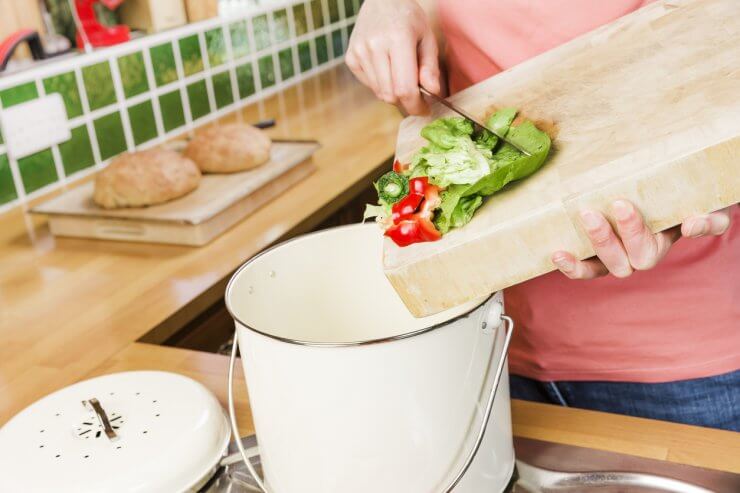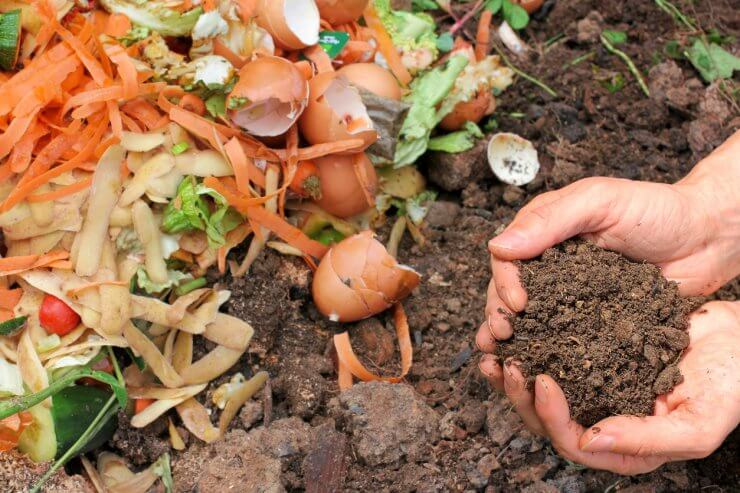
Did you know that, according to the EPA, the United States produces more than 42 million tons of food waste every year? That’s 210 cruise ships filled top to bottom, stem to stern, with food. Or for something more relatable, that’s how much 9,333 Ford F-150 pickups weigh, or 14,000 Toyota Priuses. Indeed, learning how to make natural compost isn’t going to eliminate that kind of waste.
But when you compost, you put your food waste to work. It stays out of the system of waste and then does double duty to improve soil conditions so that your garden can grow more abundant, healthier vegetables. How does growing more food keep food “out” of the waste cycle? That’s a very large and very different discussion, but you can always give your excess zucchini to your neighbors or a local soup kitchen or set up a little honor-system farm market at the end of your driveway. Problem solved!
Back to compost, though. A lot of the food we waste at home can go right into the compost bin. There are just a few basics to follow.
Discover 7 top tips for growing, harvesting, and enjoying tomatoes from your home garden—when you access the FREE guide The Best Way to Grow Tomatoes, right now!

How to make natural compost from your leftovers
The first step in learning how to make natural compost is understanding what you can and cannot compost. I like to think of it as though my compost is largely vegan: no meats, cheeses, fish, fowl, eggs (although eggshells are a great addition), milk, butter, yogurt, or other animal products. The one difference between your vegan friends and your compost, as far as diet goes, is that your friends can enjoy olive oil. Gotta keep that out of the compost bin. The short version is: No animal products, greases, or oils, with eggshells being the exception.
So what does go in your compost? Carrot peels, apple cores, onion skins, eggplant tops, coffee grinds, that scary-looking bunch of parsley that’s been hiding in the back of your fridge for three weeks. This kind of food waste might not seem like very much when you read it here, but even cooking a few days a week, you’ll be surprised how quickly it builds up.
Here’s the part where a lot of people get tripped up because we go from the excitement of composting to wondering how to make natural compost that doesn’t make your home smell like a very unkempt barnyard.
Discover 7 top tips for growing, harvesting, and enjoying tomatoes from your home garden—when you access the FREE guide The Best Way to Grow Tomatoes, right now!
Maybe you’ve heard of the famous “brown/green” mix? Basically, you’re tempering the unpleasant odors of decomposing food waste with things like shredded newspaper, dead leaves from your plants, paper egg cartons, or even yard waste like grass clippings or dry leaves in the fall. I usually try for a 50/50 mix, and my nose usually tells me when I’m off base.
As for the actual “making” compost, there’s not much to it. Once you have the mix right, nature does the work. Plan to stir it up every week or so, depending on how large your pile is. You can go big and make a three-compartment composting system, or you can keep it small with a little tumbler on your deck. You can even subscribe to a compost pickup service where you throw your food waste into a five-gallon bucket, and someone comes by every week and picks it up for you.
In other words, if you can throw your food waste in the trash, you can learn how to make natural compost. It’s almost the same thing.
Do you compost? I’d love to hear about anything you learned early on that might help those new to composting.
Discover 7 top tips for growing, harvesting, and enjoying tomatoes from your home garden—when you access the FREE guide The Best Way to Grow Tomatoes, right now!





Im not sure as to how to start composting. We have a large place here plenty of land. Not sure as to what to make the compost bin out of ? Pallets or out of a garbage bin? Ive tried plastic bucket before it did no good.
There are coffee grounds that contain CBD and I do not believe those should go into composting, but I am not positive. Do you know anything about this?
Apparently coffee grounds are not the best for compost because of the remaining caffeine that can kill earthworms, bacteria, and inhibit plant growth as described in this article: https://www.ruralsprout.com/coffee-grounds-in-the-garden/
Are citrus fruits good for composting?
Yes! There are myths that it can kill worms because of it’s acidity, but you’d have to be composting at an orange farm to really see anything like that. That said, anything acidic like citrus or tomatoes can make the compost acidic so it’s best to not overdo it. Orange peels also take a but longer to break down, so if you have time to bake them to dry them out, they’ll break down faster. Orange peels are full of nitrogen and other nutrients. :_